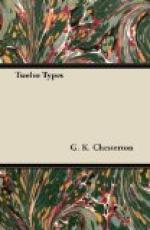[Footnote A: ‘Robert Louis Stevenson: A Life Study in Criticism.’ By H. Bellyse Baildon. Chatto & Windus.]
THOMAS CARLYLE
There are two main moral necessities for the work of a great man: the first is that he should believe in the truth of his message; the second is that he should believe in the acceptability of his message. It was the whole tragedy of Carlyle that he had the first and not the second.
The ordinary capital, however, which is made out of Carlyle’s alleged gloom is a very paltry matter. Carlyle had his faults, both as a man and as a writer, but the attempt to explain his gospel in terms of his ‘liver’ is merely pitiful. If indigestion invariably resulted in a ‘Sartor Resartus,’ it would be a vastly more tolerable thing than it is. Diseases do not turn into poems; even the decadent really writes with the healthy part of his organism. If Carlyle’s private faults and literary virtues ran somewhat in the same line, he is only in the situation of every man; for every one of us it is surely very difficult to say precisely where our honest opinions end and our personal predilections begin. But to attempt to denounce Carlyle as a mere savage egotist cannot arise from anything but a pure inability to grasp Carlyle’s gospel. ‘Ruskin,’ says a critic, ’did, all the same, verily believe in God; Carlyle believed only in himself.’ This is certainly a distinction between the author he has understood and the author he has not understood. Carlyle believed in himself, but he could not have believed in himself more than Ruskin did; they both believed in God, because they felt that if everything else fell into wrack and ruin, themselves were permanent witnesses to God. Where they both failed was not in belief in God or in belief in themselves; they failed in belief in other people. It is not enough for a prophet to believe in his message; he must believe in its acceptability. Christ, St Francis, Bunyan, Wesley, Mr Gladstone, Walt Whitman, men of indescribable variety, were all alike in a certain faculty of treating the average man as their equal, of trusting to his reason and good feeling without fear and without condescension. It was this simplicity of confidence, not only in God, but in the image of God, that was lacking in Carlyle.




